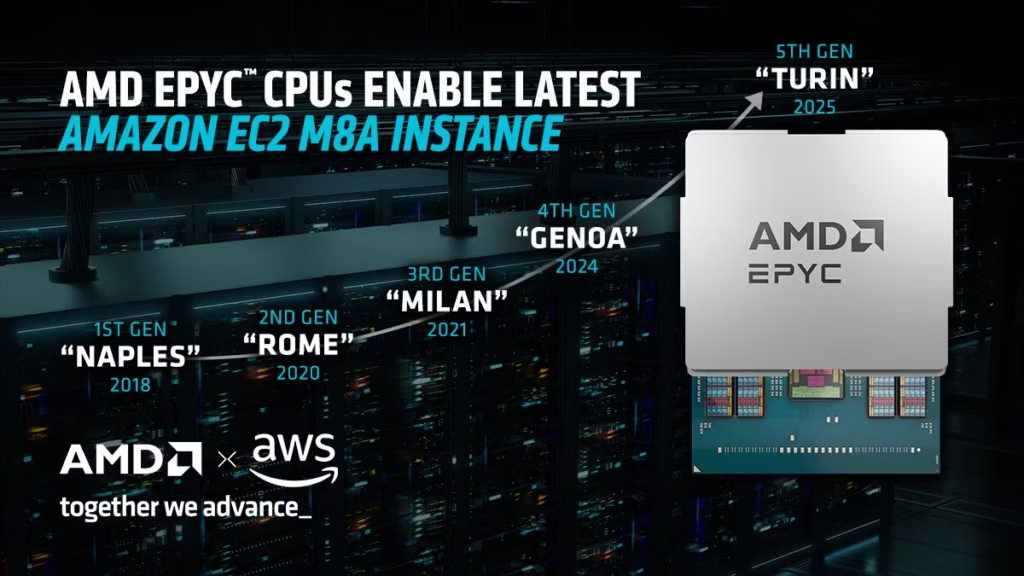
Amazon Web Services (AWS) has officially launched its latest general-purpose instance family, the Amazon EC2 M8a, powered by 5th Generation AMD EPYC™ processors. This release represents another major leap in the collaboration between AMD EPYC and Amazon cloud services, bringing customers up to 30% higher performance and 19% better price-performance than the previous generation M7a instances.
For AWS users running everything from application servers to machine learning inference and financial simulations, these new instances deliver the performance, efficiency, and scalability modern cloud workloads demand.
The evolution of AMD EPYC CPUs on AWS
AWS became the first major cloud provider to launch instances powered by AMD EPYC CPUs back in 2018. Since then, the partnership has expanded across nearly every instance family, general purpose, memory-optimized, compute-optimized, burstable, and even high-performance computing (HPC) workloads.
Each generation of AMD EPYC has brought measurable improvements in cost efficiency, throughput, and compute power, helping AWS customers push their cloud architectures further while optimizing their budgets.
According to Dan McNamara, Senior Vice President and General Manager of AMD’s Server Business, “With 5th Gen EPYC, we’re continuing to increase the performance, efficiency, and scalability customers need to power everything from modern applications to the most demanding workloads, helping them innovate faster in the cloud.”
Meet the Amazon EC2 M8a: Next-Gen general-purpose instance
The Amazon EC2 M8a instances leverage the new 5th Generation AMD EPYC processors (codename “Turin”) with a maximum frequency of 4.5 GHz. Built on the AWS Nitro System, these instances deliver up to 30% better performance and higher bandwidth across memory, networking, and storage, while not requiring extreme amounts of cooling.
Each vCPU in the M8a corresponds to a physical CPU core, meaning no Simultaneous Multi-Threading (SMT). This design choice ensures predictable performance, particularly for workloads that depend on consistent compute isolation and throughput.
M8a instances are available in ten virtualized sizes (1–192 vCPUs) and two bare metal variants, offering flexibility to scale applications from lightweight web services to large-scale enterprise systems.

Technical deep dive: What’s under the hood
The M8a’s technical improvements are substantial:
- DDR5 memory delivers up to 45% higher memory bandwidth than M7a instances.
- Network throughput climbs by 50%, now reaching up to 75 Gbps.
- EBS bandwidth increases to 60 Gbps, supporting data-intensive workloads.
- Instance Bandwidth Configuration (IBC) allows users to flexibly allocate resources between network and EBS bandwidth, boosting performance by up to 25% for specific workloads.
- Enhanced instruction set support, including AVX-512, VNNI, and bfloat16 for advanced machine learning, video encoding, and financial modeling applications.
- Built-in AMD Secure Memory Encryption (SME) with AES-256 for stronger data protection.
With these upgrades, M8a instances can handle modern cloud challenges such as real-time analytics, in-memory caching, and simulation modeling more efficiently than ever.
Performance and price gains
AWS reports up to 60% faster performance for GroovyJVM workloads and 39% faster throughput for Cassandra databases compared to M7a instances.
This generational jump is complemented by up to 19% better price-performance, giving developers and enterprises tangible cost savings. Combined with AWS’s flexible pricing models, On-Demand, Savings Plans, and Spot Instances, organizations can fine-tune both performance and budget.
As Nishant Mehta, Vice President of EC2 Product Management at AWS, noted: “The new EC2 M8a instances represent yet another milestone in our long-standing collaboration with AMD. These instances offer significant performance improvements and will provide customers with the scale and flexibility to run an even broader range of compute workloads.”
Real-World use cases: From streaming to simulation
The M8a family isn’t just about numbers. It is built for real-world results.
Netflix, for example, has already integrated AMD EPYC-based infrastructure to scale its live event streaming and machine learning workloads. According to Niall Mullen, Senior Director of Cloud Infrastructure Engineering at Netflix, “AMD EPYC-powered EC2 M8a furthers that performance, delivering new features like AVX-512 to scale our encoding, personalization, and machine learning workloads across the globe.”
Other ideal workloads include:
- Gaming and interactive media servers.
- Financial modeling and trading simulations.
- Machine learning inference and data analytics.
- Enterprise ERP systems, CRM, and mid-size databases.
- Web and application hosting with predictable, scalable performance.
SAP certification ensures M8a instances meet enterprise-grade reliability and compliance standards, making them a safe choice for large organizations migrating critical workloads to the cloud.

Why it matters for cloud computing
The arrival of AMD EPYC Amazon web servers like the M8a underscores the broader shift toward diversified CPU architectures in cloud computing. With AMD EPYC AWS instances offering both cost and performance leadership, businesses have more flexibility than ever to match infrastructure to workload demands.
It also signals increasing competition in the cloud hardware space, an area long dominated by Intel Xeon processors. As cloud computing becomes more price-sensitive, AMD’s efficiency and performance gains are positioning it as a top contender in the next wave of scalable cloud innovation.
Availability and pricing
The Amazon EC2 M8a instances are available today in US East (Ohio), US West (Oregon), and Europe (Spain) regions. Customers can launch instances via On-Demand, Savings Plans, or Spot Instances, and they’re also supported on Dedicated Hosts.
For full instance specs and regional availability, visit the official Amazon EC2 M8a Instances page.
Final thoughts: A smarter, faster cloud
With the launch of the M8a family, Amazon Web Services and AMD EPYC are proving that performance and efficiency can scale together. Whether you’re developing AI-driven applications, managing global data infrastructure, or optimizing cost-to-performance ratios, the AMD EPYC-powered Amazon EC2 M8a instances mark a new standard for balanced, high-throughput cloud computing.
As cloud demands evolve, this partnership continues to shape the foundation of next-generation Amazon cloud services, and the future looks decidedly EPYC.
With AMD’s next-generation EPYC Venice Zen 6 CPUs on the horizon, Amazon and other cloud providers could soon see even greater efficiency and scalability from AMD’s 2nm architecture



